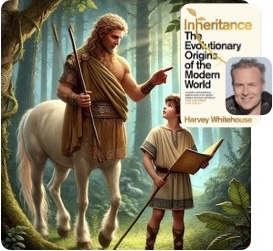
Does a person who has a past history of depression (or any other “psychological issue”) and accordingly takes up a study of psychology inevitably become a bad psychologist?
Can a person who as a youth was involved in criminal acts ever in later years be qualified to be a social worker and role model for other youth?
Can a person who once belonged to a religious cult ever be qualified to help other cult members recover from their experiences?
Can a person who was once a fundamentalist ever be qualified to study religion and the Bible objectively and honestly?
Is it possible for a person who was once a theist and is now an atheist to have a genuine, scholarly understanding of the nature of belief in God? Or for an ex-Christian to be honest and fair about Christianity?
We know the answers to those questions, at least in theory. So I was intrigued to come across the following passage in the new book by the anthropologist Harvey Whitehouse.
The positive role of rituals in human history has taken me a long time to appreciate, in part because I have had a difficult relationship with rituals personally.
This is not so unusual – many of my fellow academics study the things they find particularly difficult to master or understand.
- Political scientists often strike me as poor strategists in departmental politics,
- anthropologists struggle with the nuances of their own native groups,
- and geographers are often the colleagues most in need of directions around campus.
Although my job is to study rituals, I find them rather aversive – particularly the routinized kind we were all obliged to participate in at school in the form of assemblies and chapel services. These activities seemed at the time to be not only pointless and dull but sometimes even menacingly oppressive and authoritarian. I am not alone in thinking this way, of course. As we will see in the final part of this book, many societies are shedding their ritual traditions at a rapid pace, not only through secularization but by dismissing as irrelevant or oppressive many long-established rituals associated with schooling, professional guilds, the institutions of government, and everyday domestic life. However, the more I have learned about the effects of participation in frequent collective rituals, the more I have come to appreciate their importance in fostering large-scale cohesion, cooperation, and future-mindedness. I have argued that ritual routinization helped the first farmers to settle down and create larger and larger cultural groups. But this was only the beginning of a much more complex process. . . .
Whitehouse, Harvey. Inheritance (p. 134). Cornerstone. Kindle Edition. – my formatting
Ditto!
And that is why this blog — despite my mixed background in religious experiences and current atheism — is not an “anti-Christian” blog. My interest is in understanding and learning from the latest research. My posts about the Bible are not efforts to “debunk” the Bible. It is about understanding its origins and accounting for its influence. The same for the question that seems to rile many people more than others: Did Jesus exist? That question has no interest for me. My interest is in understanding the origin and nature of the idea of Jesus in the history of religion. My interest is in applying the methods of professional research into all these questions — historical, psychological, anthropological.
Think of personal relevance. It is only natural and right and even beneficial if we take up studies in areas where our personal experiences and challenges have led us. The desire is to understand, overcome, and help others navigate similar circumstances and ideas.


